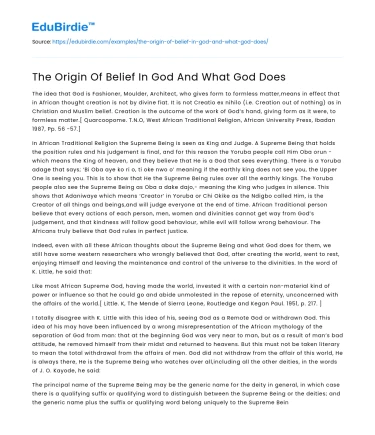The idea that God is Fashioner, Moulder, Architect, who gives form to formless matter,means in effect that in African thought creation is not by divine fiat. It is not Creatio ex nihilo (i.e. Creation out of nothing) as in Christian and Muslim belief. Creation is the outcome of the work of God’s hand, giving form as it were, to formless matter.[ Quarcoopome. T.N.O, West African Traditional Religion, African University Press, Ibadan 1987, Pp. 56 -57.]
In African Traditional Religion the Supreme Being is seen as King and Judge. A Supreme Being that holds the position rules and his judgement is final, and for this reason the Yoruba people call Him Oba orun - which means the King of heaven, and they believe that He is a God that sees everything. There is a Yoruba adage that says; ‘Bi Oba aye ko ri o, ti oke nwo o’ meaning if the earthly king does not see you, the Upper One is seeing you. This is to show that He the Supreme Being rules over all the earthly kings. The Yoruba people also see the Supreme Being as Oba a dake dajo,- meaning the King who judges in silence. This shows that Adaniwaye which means ‘Creator’ in Yoruba or Chi Okike as the Ndigbo called Him, is the Creator of all things and beings,and will judge everyone at the end of time. African Traditional person believe that every actions of each person, men, women and divinities cannot get way from God’s judgement, and that kindness will follow good behaviour, while evil will follow wrong behaviour. The Africans truly believe that God rules in perfect justice.
Save your time!
We can take care of your essay
- Proper editing and formatting
- Free revision, title page, and bibliography
- Flexible prices and money-back guarantee
Indeed, even with all these African thoughts about the Supreme Being and what God does for them, we still have some western researchers who wrongly believed that God, after creating the world, went to rest, enjoying Himself and leaving the maintenance and control of the universe to the divinities. In the word of K. Little, he said that:
Like most African Supreme God, having made the world, invested it with a certain non-material kind of power or influence so that he could go and abide unmolested in the repose of eternity, unconcerned with the affairs of the world.[ Little. K, The Mende of Sierra Leone, Routledge and Kegan Paul. 1951, p. 217. ]
I totally disagree with K. Little with this idea of his, seeing God as a Remote God or withdrawn God. This idea of his may have been influenced by a wrong misrepresentation of the African mythology of the separation of God from man: that at the beginning God was very near to man, but as a result of man’s bad attitude, he removed himself from their midst and returned to heavens. But this must not be taken literary to mean the total withdrawal from the affairs of men. God did not withdraw from the affair of this world, He is always there, He is the Supreme Being who watches over all,including all the other deities, in the words of J. O. Kayode, he said:
The principal name of the Supreme Being may be the generic name for the deity in general, in which case there is a qualifying suffix or qualifying word to distinguish between the Supreme Being or the deities; and the generic name plus the suffix or qualifying word belong uniquely to the Supreme Being. There are cases where the name for the Supreme Being is uniquely his, and no part of it is shared by any other being. But where the deities share the basic generic name with the Supreme Being, it only serves the fact that the deities derive their being from it.[ Kayode. J. O, & Adelowo. E.D. “Religions in Nigeria”, in: R. Olaniyan (ed.), Nigerian History and Culture, New York. 1975. p. 34 ]
This is to show that other deities and divinities got their existence from the Supreme Being. The African Traditional Religion does not have missionaries that goes out there to preach and convert people to accept their faith, likewise, they do not go around distributing leaflets and asking people to come and worship with them. In the words of O.I. Igwegbe, in the African Traditional Religion: People are born into it, not converted.[ Igwegbe O.I Sacramental Theological Thinking in the African Symbolic Universe. p . 44]
This idea of Remote God or withdrawn God of K. Little was also rejected by O. A. Onwubiko who sees the theory as a bad misrepresentation of the true nature of the African Traditional Religion, and he maintained that this misrepresentation: technically called the Deus otiosus theory in Religious Studies, ...was introduced and is still maintained by those who want to occult and misrepresent the real contents and meaning of African traditional religious and cultural heritage. [ Onwubiko O.A, Echoes From the African Synod, Enungu: 1994, p134.]
This is why African Traditional Religion is totally different from other religions of the world. Let us now look at the mode of worship in the African Traditional Religious setting.






 Stuck on your essay?
Stuck on your essay?

